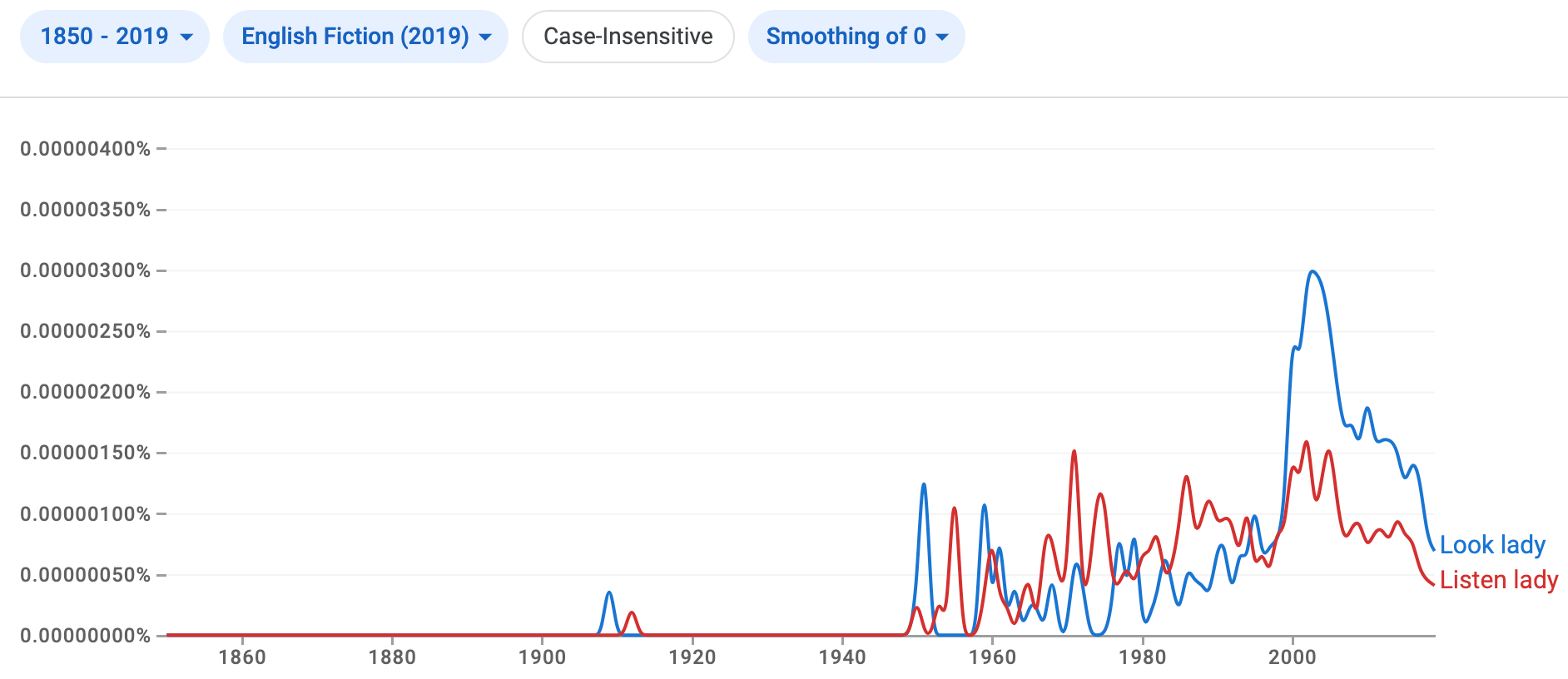This question is inspired by the wonderfully-named subreddit r/IDontWorkHereLady.
When a proficient English speaker addresses someone as "lady" (as opposed to "ma'am"), it seems to often be used as a faux-polite way of expressing displeasure at someone's behavior. For example, a statement like "Lady, I think you need to stand in line over there" could suggest, "I'm upset that you were inconsiderate enough to cut in line".
I find it interesting that while the word "lady" by itself has a respectful connotation, it has gained the opposite connotation when used as an address. Does this kind of paradoxical semantic shift have a name? Is it a known linguistic phenomenon?
I'm also curious about the etymology of this usage. When did this shift in meaning come about, and what might have caused it?
I tried searching Google Ngram Viewer for "Look lady" and "Listen lady", both capitalized so as to occur at the start of a sentence, with the hope that these ngrams would reflect the usage of "lady" in a derogatory/dismissive sense.
It seems to have come into usage around 1950, and really took off in the late 1990s. I do wonder whether this simply reflects a change in the composition of Google's dataset (that is, an increase in informal speech in fiction writing), or whether real-world usage actually changed.
Sampling usage on Google Books from different time periods, it seems that the meaning shifts subtly from informal neutral to derogatory:
As we stood there, one of the newspapermen sauntered over and looked mournfully at the old lady. "Look, lady," he began, "I make only eighteen dollars a week. I'm only twenty-six. and I've got to support a wife and two kids.
"This can't be it!" Cherry said.
The taxi driver turned around. "Look, lady. You give me an address, did'n' ya? I ain't responsible for this here crazy Greenwich Village."
Cherry alighted. She peered around, delighted and astonished, at the narrow crooked street and the ancient, little brick houses.
"Seventy-five cents, lady."
"Oh! Here you are." She paid him, then reached the cab for her suitcase.
The taxi driver looked skeptically at the ten-cent tip she had given him. Then he studied Cherry, fresh-faced and trim, in her red suit and tiny black hat perched on her black curls.
"Look, lady. You ain't the Village type. You shoulda stood in Brooklyn. Like me."
She replied, "Dr. Martin Luther King can follow Jesus's teachings, why can't you be as strong in faith as he is? Killing never solved any problems."
I countered with, "Look, lady, those four little black kids killed last summer in Birmingham were in your Lord Jesus's sanctuary, a Christian Baptist church, and they were blown to bits by nice, white racist Christians.
"Look, lady, we're closing in fifteen minutes, and I'm not about to get involved in your transaction."
The bartender glanced around, too, and leaned toward her, whispering, none too softly.
"Look, lady, if you've got some kind of rendezvous, that ain't none of my business, I don't want to know, but that's what the back door is for."
Anyways, this is what I found. I'd be curious about whatever details people can fill in on the etymology here.

